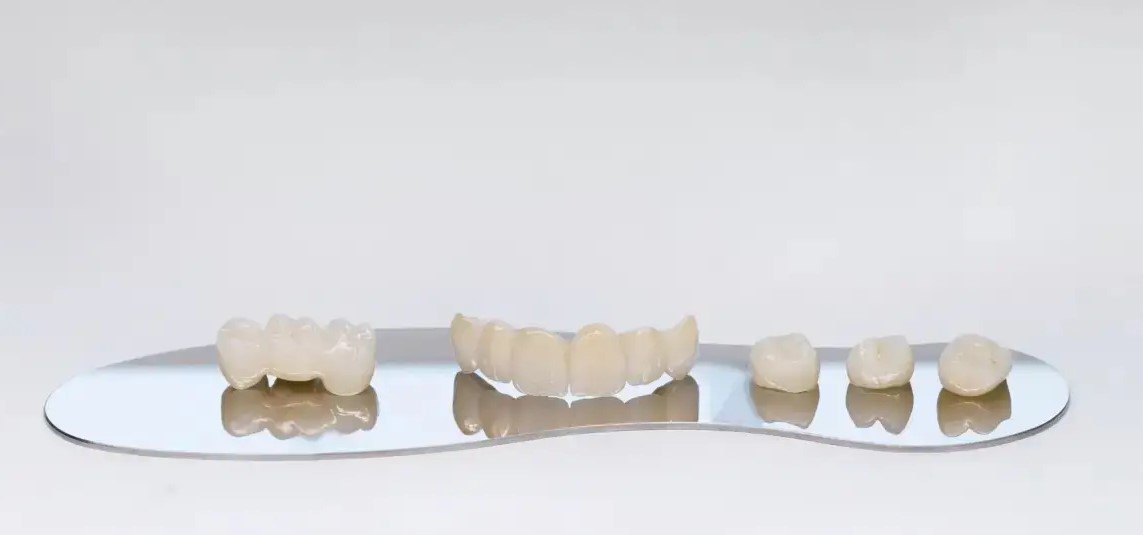Dental Bridges
A dental bridge is a restorative dental treatment designed to "bridge" the gap created by one or more missing teeth. A bridge consists of one or more artificial teeth (called pontics) that are anchored in place by adjacent natural teeth or dental implants. These artificial teeth are carefully crafted to blend seamlessly with your natural teeth, ensuring a natural and aesthetically pleasing appearance.
There are several types of dental bridges, including:
Traditional Dental Bridge
A traditional dental bridge is the most common type and involves placing crowns on the teeth adjacent to the missing tooth (called abutment teeth). These crowns support the artificial tooth (pontic) that fills the gap. This type of bridge is strong and durable and is typically used when there are healthy teeth on either side of the missing tooth.
Cantilever Dental Bridge
A cantilever bridge is similar to a traditional bridge but is used when there is only one adjacent tooth available to support the bridge. This type of bridge is less common and is typically used in areas of the mouth that experience less chewing pressure, such as the front teeth.
Maryland Dental Bridge
A Maryland bridge uses a metal or porcelain framework that is bonded to the back of the adjacent teeth rather than crowns. This type of bridge is more conservative because it doesn't require as much alteration to the surrounding teeth. However, it may not be as strong as a traditional bridge and is often used for replacing front teeth.
Implant-Supported Dental Bridge
An implant-supported bridge is anchored by dental implants rather than natural teeth. This is the most durable and stable option and is often recommended for patients who are missing several teeth in a row. Implant-supported bridges do not rely on the surrounding teeth for support, which helps preserve the integrity of adjacent teeth.
At Tuscaloosa General Dentistry, our dentist in Tuscaloosa, AL, will evaluate your oral health and recommend the type of bridge that best suits your needs. Contact us to learn more.
Benefits of Dental Bridges in Tuscaloosa, AL
Dental bridges can provide numerous benefits, making them an excellent option for patients looking to restore missing teeth. Here are some of the key advantages of dental bridges:
Restores Functionality
One of the primary benefits of dental bridges is the restoration of normal chewing and speaking functions. Missing teeth can make it difficult to eat certain foods or pronounce words clearly. A dental bridge fills the gap left by missing teeth, enabling you to enjoy your favorite foods and speak without difficulty.
Improves Aesthetics
Missing teeth can affect the appearance of your smile, which can lead to self-consciousness or embarrassment. Dental bridges are designed to look like your natural teeth, blending in seamlessly with the rest of your smile. This can improve your overall appearance and boost your confidence.
Prevents Teeth From Shifting
When a tooth is missing, the surrounding teeth may begin to shift out of their normal positions, leading to bite misalignment, gaps, and other dental issues. A dental bridge helps maintain the position of your natural teeth, preventing them from shifting and causing further problems.
Maintains Facial Structure
Missing teeth can cause the jawbone to deteriorate over time, which can lead to a sunken or aged appearance. A dental bridge helps maintain the structure of your jaw and face by filling in the gaps and providing support to the surrounding teeth and tissues.
Long-Lasting Solution
Dental bridges are durable and, with proper care, can last for many years. Traditional and implant-supported bridges are particularly long-lasting, making them a reliable and effective solution for tooth replacement.
The Dental Bridge Procedure in Tuscaloosa, AL
The process of getting a dental bridge typically requires two or more visits to Tuscaloosa General Dentistry. Here's a step-by-step overview of what you can expect during the dental bridge procedure:
Initial Consultation
The first step in getting a dental bridge is a comprehensive consultation with Dr. John Carlson. During this visit, Dr. Carlson will perform a thorough examination of your mouth, including X-rays or digital scans, to assess the condition of your teeth, gums, and jawbone. Based on the examination, he will recommend the most suitable type of dental bridge for your specific needs.
If you have healthy teeth on either side of the gap, a traditional or cantilever bridge may be the best option. If you're missing several teeth or have weakened surrounding teeth, Dr. Carlson may suggest an implant-supported bridge for added stability.
Tooth Preparation
If you are getting a traditional or cantilever bridge, the next step is to prepare the abutment teeth. These are the natural teeth adjacent to the gap that will support the bridge. Dr. Carlson will carefully reshape the abutment teeth by removing a small amount of enamel to make room for the crowns that will hold the bridge in place.
For patients receiving an implant-supported bridge, dental implants will be placed into the jawbone during a minor surgical procedure. The implants will need time to integrate with the bone as the latter heals, which can take several months. Once the implants are fully integrated, the bridge can be attached.
Impressions and Temporary Bridge
After preparing the abutment teeth, Dr. Carlson will take impressions of your teeth, either using a traditional mold or a digital scanner. These impressions will be used to create a custom dental bridge that fits your mouth perfectly. While the permanent bridge is being fabricated, Dr. Carlson will place a temporary bridge to protect the exposed teeth and gums.
Fitting the Permanent Bridge
Once your permanent bridge is ready, you'll return to the office for a fitting. Dr. Carlson will carefully place the bridge and check the fit, making any necessary adjustments to ensure comfort and proper alignment with your bite. Once the bridge fits perfectly, it will be permanently cemented in place.
For implant-supported bridges, the bridge will be attached to the dental implants using special connectors.
Follow-up Appointments
After the bridge has been placed, Dr. Carlson may schedule a follow-up visit to check how the bridge is functioning and to ensure there are no issues with your bite or comfort. Regular dental checkups and cleanings are essential for maintaining the longevity of your bridge and your overall oral health.
Restore Your Smile With Custom Dental Bridges
A dental bridge is a proven and effective solution for restoring missing teeth, helping to bring back both the function and aesthetics of your smile. Whether you're missing one tooth or several, a well-crafted dental bridge can make a significant difference in your ability to chew, speak, and smile with confidence. At Tuscaloosa General Dentistry, Dr. John Carlson and his experienced team are dedicated to providing personalized dental care, ensuring that every bridge is customized to meet the unique needs of each patient.
Ready to achieve your best smile? Schedule your appointment with Dr. John Carlson at Tuscaloosa General Dentistry today! Call us at (205) 553-4477 or visit us at 631 Helen Keller Blvd #200, Tuscaloosa, AL 35404, and let us help you on your journey to optimal dental health.
Composite Bonding
Fixed Dentures
Implant-Supported Dentures
Denture & Partials
Dental Implant Restoration
Composite Dental Fillings
Restorative Dentistry
Sports Mouth Guards
Oral Cancer Screening
Fluoride Treatment
Dental Cleaning & Exams
General Dentistry
Teeth Whitening
Dental Bonding
Cosmetic Dentistry
Complex Case Solutions
Veneers
Night Guards / TMJ Treatment
Crowns
TMJ Treatment


Office Hours
MON8:00 am - 5:00 pm
TUE8:00 am - 5:00 pm
WED8:00 am - 5:00 pm
THU7:00 am - 3:00 pm
FRIClosed
SATClosed
SUNClosed




